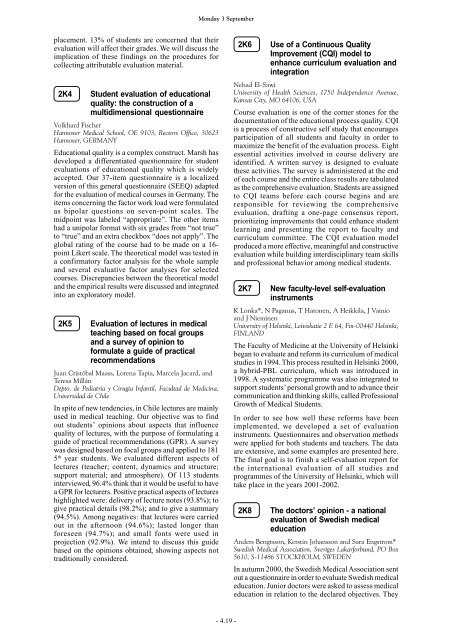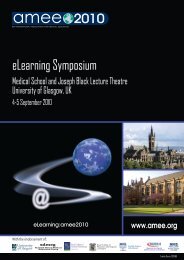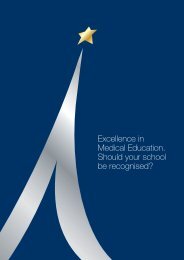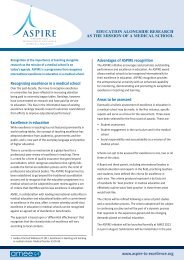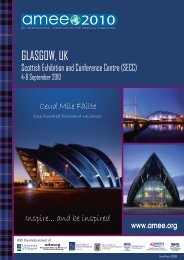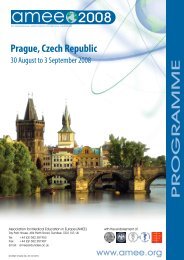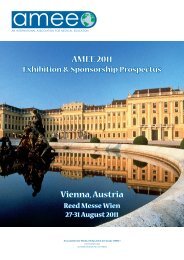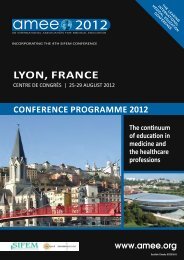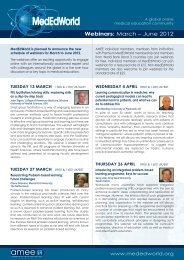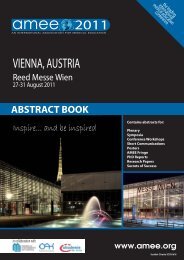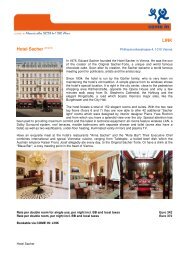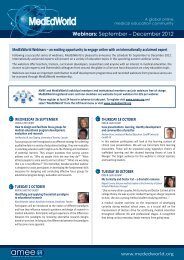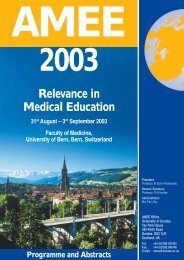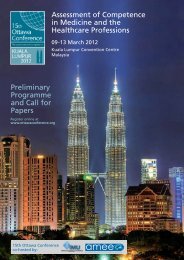AMEE Berlin 2002 Programme
AMEE Berlin 2002 Programme
AMEE Berlin 2002 Programme
Create successful ePaper yourself
Turn your PDF publications into a flip-book with our unique Google optimized e-Paper software.
placement. 13% of students are concerned that their<br />
evaluation will affect their grades. We will discuss the<br />
implication of these findings on the procedures for<br />
collecting attributable evaluation material.<br />
2K4 Student evaluation of educational<br />
quality: the construction of a<br />
multidimensional questionnaire<br />
Volkhard Fischer<br />
Hannover Medical School, OE 9103, Rectors Office, 30623<br />
Hannover, GERMANY<br />
Educational quality is a complex construct. Marsh has<br />
developed a differentiated questionnaire for student<br />
evaluations of educational quality which is widely<br />
accepted. Our 37-item questionnaire is a localized<br />
version of this general questionnaire (SEEQ) adapted<br />
for the evaluation of medical courses in Germany. The<br />
items concerning the factor work load were formulated<br />
as bipolar questions on seven-point scales. The<br />
midpoint was labeled “appropriate”. The other items<br />
had a unipolar format with six grades from “not true”<br />
to “true” and an extra checkbox “does not apply”. The<br />
global rating of the course had to be made on a 16point<br />
Likert scale. The theoretical model was tested in<br />
a confirmatory factor analysis for the whole sample<br />
and several evaluative factor analyses for selected<br />
courses. Discrepancies between the theoretical model<br />
and the empirical results were discussed and integrated<br />
into an exploratory model.<br />
2K5 Evaluation of lectures in medical<br />
teaching based on focal groups<br />
and a survey of opinion to<br />
formulate a guide of practical<br />
recommendations<br />
Juan Cristóbal Maass, Lorena Tapia, Marcela Jacard, and<br />
Teresa Millán<br />
Depto. de Pediatría y Cirugía Infantil, Facultad de Medicina,<br />
Universidad de Chile<br />
In spite of new tendencies, in Chile lectures are mainly<br />
used in medical teaching. Our objective was to find<br />
out students’ opinions about aspects that influence<br />
quality of lectures, with the purpose of formulating a<br />
guide of practical recommendations (GPR). A survey<br />
was designed based on focal groups and applied to 181<br />
5th year students. We evaluated different aspects of<br />
lectures (teacher; content, dynamics and structure;<br />
support material; and atmosphere). Of 113 students<br />
interviewed, 96.4% think that it would be useful to have<br />
a GPR for lecturers. Positive practical aspects of lectures<br />
highlighted were: delivery of lecture notes (93.8%); to<br />
give practical details (98.2%); and to give a summary<br />
(94.5%). Among negatives: that lectures were carried<br />
out in the afternoon (94.6%); lasted longer than<br />
foreseen (94.7%); and small fonts were used in<br />
projection (92.9%). We intend to discuss this guide<br />
based on the opinions obtained, showing aspects not<br />
traditionally considered.<br />
Monday 3 September<br />
- 4.19 -<br />
2K6 Use of a Continuous Quality<br />
Improvement (CQI) model to<br />
enhance curriculum evaluation and<br />
integration<br />
Nehad El-Sawi<br />
University of Health Sciences, 1750 Independence Avenue,<br />
Kansas City, MO 64106, USA<br />
Course evaluation is one of the corner stones for the<br />
documentation of the educational process quality. CQI<br />
is a process of constructive self study that encourages<br />
participation of all students and faculty in order to<br />
maximize the benefit of the evaluation process. Eight<br />
essential activities involved in course delivery are<br />
identified. A written survey is designed to evaluate<br />
these activities. The survey is administered at the end<br />
of each course and the entire class results are tabulated<br />
as the comprehensive evaluation. Students are assigned<br />
to CQI teams before each course begins and are<br />
responsible for reviewing the comprehensive<br />
evaluation, drafting a one-page consensus report,<br />
prioritizing improvements that could enhance student<br />
learning and presenting the report to faculty and<br />
curriculum committee. The CQI evaluation model<br />
produced a more effective, meaningful and constructive<br />
evaluation while building interdisciplinary team skills<br />
and professional behavior among medical students.<br />
2K7 New faculty-level self-evaluation<br />
instruments<br />
K Lonka*, N Paganus, T Hatonen, A Heikkila, J Vainio<br />
and J Nieminen<br />
University of Helsinki, Leiviskatie 2 E 64, Fin-00440 Helsinki,<br />
FINLAND<br />
The Faculty of Medicine at the University of Helsinki<br />
began to evaluate and reform its curriculum of medical<br />
studies in 1994. This process resulted in Helsinki 2000,<br />
a hybrid-PBL curriculum, which was introduced in<br />
1998. A systematic programme was also integrated to<br />
support students’ personal growth and to advance their<br />
communication and thinking skills, called Professional<br />
Growth of Medical Students.<br />
In order to see how well these reforms have been<br />
implemented, we developed a set of evaluation<br />
instruments. Questionnaires and observation methods<br />
were applied for both students and teachers. The data<br />
are extensive, and some examples are presented here.<br />
The final goal is to finish a self-evaluation report for<br />
the international evaluation of all studies and<br />
programmes of the University of Helsinki, which will<br />
take place in the years 2001-<strong>2002</strong>.<br />
2K8 The doctors’ opinion - a national<br />
evaluation of Swedish medical<br />
education<br />
Anders Bengtsson, Kerstin Johansson and Sara Engstrom*<br />
Swedish Medical Association, Sveriges Lakarforbund, PO Box<br />
5610, S-11486 STOCKHOLM, SWEDEN<br />
In autumn 2000, the Swedish Medical Association sent<br />
out a questionnaire in order to evaluate Swedish medical<br />
education. Junior doctors were asked to assess medical<br />
education in relation to the declared objectives. They


